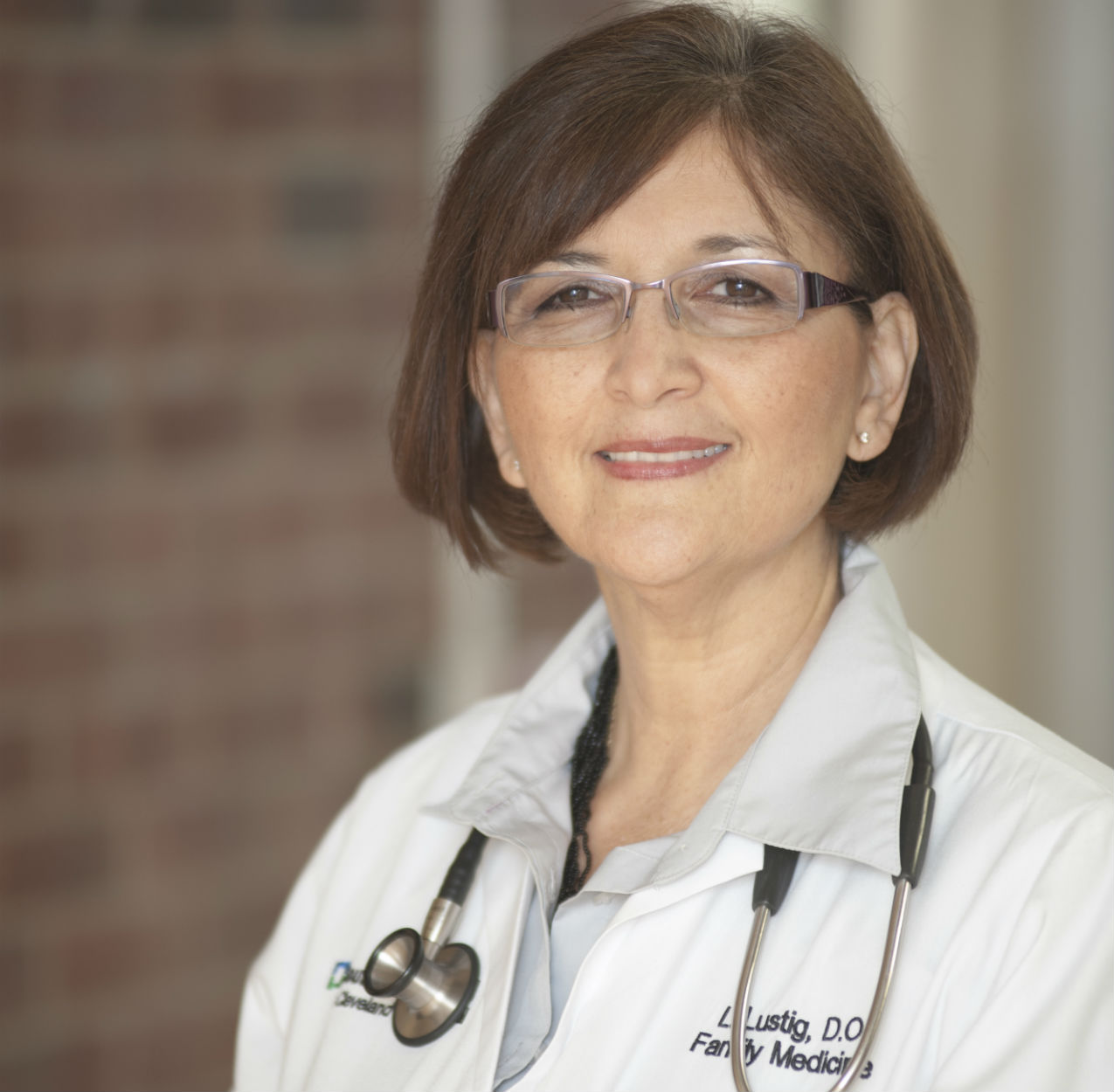 Courtesy of Cleveland Clinic
Courtesy of Cleveland Clinic
When Lili A. Lustig became a caregiver for her mother who was suffering from scleroderma, she still had a very long road ahead on the path to becoming a doctor of osteopathic medicine.
Even so, Lustig knew enough from her mom’s health history to tell the doctors that they wouldn’t be able to draw blood from her mother’s weakened vascular system without using a central line, a port or a PIC line.
When she pleaded with the doctors, they said they had to follow hospital protocols before they could employ one of these techniques.
“Even today, years later, I still grieve for her loss, not just because of the care she received, but because of the devastating medical condition she had. However, long before I thought I had the ability, the mental strength, or educational ability to get to medical school I had enough experience as a care provider for my mom that I knew that the doctors needed to listen to me and my family members. I did not get that from the physicians who saw her,” said Lustig.
Lustig is not the only woman who feels that health care providers could do more to meet their health care needs and those of their loved ones.
A recent study from the Center for Talent Innovation, conducted in conjunction with Grey Healthcare Group in New York City, found that 59 percent of women make health care decisions for others — a percentage that grows to 94 percent when you consider working mothers.
Yet a follow-up study by GHG found that women’s needs are very often left unmet by almost every key health stakeholder, including physicians and pharmacists.
In fact, when women were queried about whether their primary care doctors ask and listen to women’s questions and concerns, just 56 percent of women agreed, while 89 percent of those physicians believed that they do exhibit this behavior.
What’s more, although 87 percent of these doctors believed their patients trust them, only 69 percent of patients said they trusted their primary care physician “a lot” or “completely.”
Similarly, only 36 percent of women said that their pharmacists “discuss pharmaceutical options and alternatives,” while 72 percent of pharmacists believed they were having tête-à-têtes, or one-on-one conversations, with patients about these matters.
Devastated by her experience, Lustig recalls that when she told her husband that she could do a better job than her mom’s doctors, he encouraged her to go to medical school.
“I went back to school and said, I’m going to make a difference in patient care, and I’m going to listen to what my patients and their families are telling me,” said Lustig, who was 48-years-old when she returned to school to embark on her medical career.
Lustig is now a D.O. and a family medicine physician at Cleveland Clinic.
Today, Lustig points out that it’s especially important for health care providers to listen to women because they have different signs and symptoms of disease that don’t meet “the expectations in the textbook of symptoms.”
For example, women may sometimes experience different symptoms than men when they are having a heart attack. They generally don’t feel well and may complain of a stomach ache.
“They are having a heart attack and they pooh pooh it, and say, ‘I’m a caregiver, and a mother and I have to do whatever.’ It’s not the same as for a man who has a crushing elephant sitting on his chest, and says, ‘I’m having a heart attack,’ and you take him to the hospital. Women aren’t even listened to because they don’t meet that category,” said Lustig.
Getting to Know You
So Lustig devotes time and effort to getting to know her patients even before she treats them for medical problems. She enters notes in their medical chart that will spark her memory, and which create what she dubs “a personal attachment.”
“If they send me a holiday card, I’ll put a note that they sent me a card, or their daughter is going to college, or their son is going to the military. It’s not always about what their disease is. It’s who they are and that helps a lot.”
Many of Lustig’s patients have had scarce access to health care and she even sees patients who are 65 years old who are visiting her for the first time.
“They don’t have trust in the doctor, or in the medications we are going to give them, or what the labs are saying, or they don’t understand the labs, so there’s no trust at all,” said Lustig.
Offering a generous 40-minute new-patient encounter is paramount to gaining their trust. During this visit Lustig gathers social, health, family and medication history.
“If I'm missing data or information that I feel can be critical for me to treat them, that's when I start ordering what they need. Sometimes it’s going to take several visits to get to all of it, because if someone doesn’t have trust and all of a sudden you say, you haven’t had labs, a mammogram, colonoscopy, vaccinations, and by the way you need to come in for a well woman visit, that’s too overwhelming. They are not going to come in,” said Lustig.
When Lustig fills out her patients’ charts, she indicates what she has addressed, and what needs to be addressed in future visits.
“They're afraid of the results. Usually if they don’t get it done, I say, ‘we still need the mammogram.’ I don’t get mad at them, but I keep reminding them that this is the next step. I use the data available to manage what still hasn’t been done.”
In addition to getting mammograms, well woman exams, and screenings for heart disease, women also need to keep up to date with vaccines to prevent diseases, such as cervical cancer, shingles and pneumonia.
Lustig said that as caregivers, women often encourage their husbands to get checkups and they take their children to the doctor, but they neglect themselves.
Offering empathy and connecting women to resources is also crucial.
“Every day I deal with people who have devastating things happen, whether the loss of a child or spouse. I lend an empathic ear to what they are saying, and provide care to them and let them know we’re here to help them. We have behavioral health specialists if someone is grieving or having anxiety or depression,” said Lustig.
Education is Key
Every patient Lustig sees receives educational materials about dieting, vaccines, the Dietary Approaches to Stop Hypertension or DASH diet, and other patient goals. She also provides written instructions about their medications, what they should do between visits, and other doctors they should see.
If patients get stymied, she tells them to take a pencil and check off each thing that they accomplish on their list.
When Lustig isn’t seeing patients, she’s busy teaching medical residents. She instructs them to record every detail in their patients’ notes lest they forget something that may be critical down the road.
“We try to continually talk to the residents about followup and to talk to patients about their lab results, calling them if you see something out of range, or if things are fine, calling and saying, ‘hey, you just had your mammogram, it looks great, you don’t need one for a year.’”
Providing a personal touch is a gesture which pharmacists can also make to build trust with women patients.
Joel Zive, regional sales director of Aureus Specialty Pharmacy, said, "Pharmacists can help women patients by asking their name when conversing with them. Make sure they can see your name badge as well. This small gesture will show women that you care and will help build a trusting, caring relationship."
Finally, Lustig summed up what health care providers can do to meet the medical needs of women best. She reflected on the fact that women may be having symptoms that go unrecognized.
“You have to have a little ding, ding, a bell that goes off in your head and that’s what I listen to all the time, that feeling that there’s something here that is not clicking with me. And that’s what I try to pass down to the residents who I teach today, and in the care I provide to my patients.”
Reviewed February 29, 2016
by Michele Blacksberg RN
Edited by Jody Smith
The Health Care Industry Needs to Start Taking Women Seriously. Harvard Business Review. Retrieved February 18, 2016.
https://hbr.org/2015/05/the-health-care-industry-needs-to-start-taking-women-seriously
Dr. Lili A. Lustig. Interview.





Add a CommentComments
There are no comments yet. Be the first one and get the conversation started!